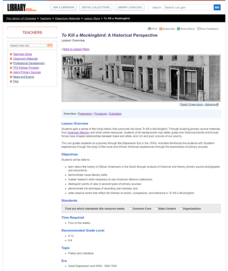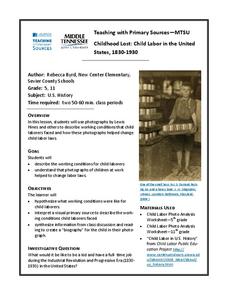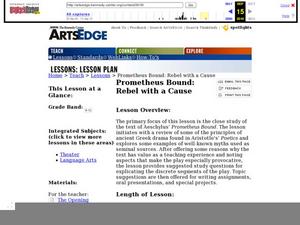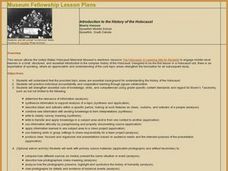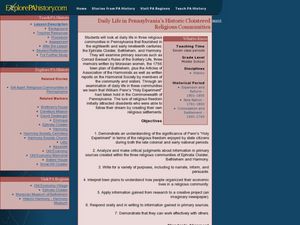Curated OER
A Primary Source Picture Book
Travel through Europe with ten-year-old Teddy Roosevelt in this writing activity, which uses the picture book My Tour of Europe: by Teddy Roosevelt, by Ellen Jackson. After reading the book, readers compare it to passages from The...
Library of Congress
To Kill A Mockingbird: A Historical Perspective
Students study the novel, To Kill a Mockingbird. Through studying primary source materials from American Memory and other online resources, students of all backgrounds study the relationships between blacks and whites.
National Endowment for the Humanities
Lesson 2: The United States, France, and the Problem of Neutrality, 1796–1801
While the French Revolution could be considered inspired by the American Revolution, it created thorny problems for the new United States. Should the United States get involved and be drawn into a European drama? Was the US strong...
Curated OER
Voices from Little Rock: Understanding the Civil Rights Movement through Primary Sources
As part of a study of the Civil Rights Movement, class members examine documents associated with the Little Rock Nine, the Brown v. Board of Education ruling, the 14th and 15th Amendments to the US Constitution, and chapters from Melba...
University of Chicago
Using Artifacts for Clues About Identity
Learn about the ancient Near East through a close examination of ancient artifacts. Lead your class into analysis by first observing an artifact as a class. Pupils can then work in pairs to analyze the other artifacts and compile a list...
National Endowment for the Humanities
Victory and the New Order in Europe
A New Order in Europe calls for a new lesson plan! This third plan in a series of four sequential lessons encourages high schoolers to read primary sources about the development of the New Order and follow up their knowledge with a...
Shmoop
ELA - Literacy.CCSS.ELA-Literacy.RH.9-10.1
Do your pupils know what a primary source is? How about a secondary source? Provide them with the information here about different types of documents and then test their knowledge with a brief quiz. The quiz is made up of two documents....
National Endowment for the Humanities
A Journalist’s Report: The Better Vision for Black Americans
After reading a series of primary source documents detailing the teachings of Martin Luther King, Jr. and Malcolm X, class members craft newspaper columns assessing the strengths and weaknesses of each man's vision, and present their...
National Endowment for the Humanities
The War in the North, 1775–1778
Using primary source documents, including maps, learners examine Revolutionary War events from 1775 to 1778. The focus here is on the challenges George Washington and the Continental army faced and how they persevered in spite of those...
Curated OER
Childhood Lost: Child Labor in the United States, 1830-1930
Working in groups, middle and high schoolers describe and discuss photographs depicting working conditions experienced by child laborers in the 19th century. They then write a persuasive paragraph supporting an amendment to regulate the...
Benjamin Franklin Tercentenary
The Autobiography of Benjamin Franklin
Need a model for character education? Benjamin Franklin presents himself as in a constant state of striving to become the man he hoped to be, making his autobiography is far more accessible to learners than those of people who consider...
Curated OER
Found Poetry with Primary Sources: The Great Depression
Students read a sample found poem and create one together as a class. In this Great Depression lesson, students select a topic, such as miners, and read primary source documents related to the topic. Students select one narrative as the...
Curated OER
Unit 2: Post-Revolution: The Critical Period 1781-1878
The post-Revolutionary Period of 1781-1787, also known as the Critical Period, is the focus of a series of lessons that prompt class members to examine primary source documents that reveal the instability of the period of the Articles of...
Albert Shanker Institute
Dream Under Development
As part of their study of the 1963 March on Washington, class members do a side-by-side comparison of the original text of Martin Luther King's "I Have a Dream Speech" with a transcript of the speech he delivered. The take away from the...
Curated OER
Prometheus Bound: Rebel with a Cause
If you are teaching Aeschylus' Prometheus Bound, you can't afford to miss this source. An extensive list of ideas outlines numerous discussion topics, writing prompts, comprehension questions, oral presentations, and projects. Have class...
Maryland Department of Education
The Concept of Diversity in World Literature Lesson 9: Debating Imperialism
To gain an understanding of Imperialism, class members read Rudyard Kipling's poem, "The White Man's Burden" and Mark Twain's essay, "To the Person Sitting in Darkness." Groups compare these perceptions of non-white cultures with the...
Benjamin Franklin Tercentenary
Benjamin Franklin: Master Diplomat for One Last Time
At 81, Benjamin Franklin was the oldest delegate to the 1787 Constitutional Convention, where he exercised significant influence in shaping key elements of how the United States operates. The class examines his role, using “The Scene at...
Curated OER
Edward R. Murrow: This Reporter
What would Edward R. Murrow think of today’s news broadcasts? Learners examine the work of the first public television newscaster and his commitment to researched, accurate reporting. The eight-day study concludes with investigators...
Curated OER
Unit 1: Building Historical Background Knowledge: The Road to Revolution 1754–1776
What were the conditions that led to the American Revolution? What are the conditions that lead to revolution in other times and places? Class members examine primary source materials and use evidence drawn from these documents to craft...
Curated OER
Introduction to the History of the Holocaust
The Holocaust is unbelievable! Examine this piece of history with your class. Using the Internet, research groups determine the relevance of information presented, compare how different sites present the same information, synthesize...
National Endowment for the Humanities
Soviet Espionage in America
The war against Communism and Joseph McCarthy’s place in it are the focus of a series of three lessons examining postwar America from 1945-1950. This first lesson asks groups to read an introduction that describes the Verona Project and...
Canadian War Museum
Comparing Primary and Secondary Sources
This simple two-day lesson introduces learners to the differences between primary and secondary sources. The lesson includes group work that explores the similarities and differences, and the advantages and disadvantages of primary and...
Curated OER
"In God We Trust": The Camden Man Who Put the Missing Motto on the Dollar Bill
Here is a fascintating instructional activity which relates how the motto "In God We Trust" came to appear on all US currency. It turns out that a man from Arkansas came up with the idea and petioned his congressman and President...
Curated OER
Daily Life in Pennsylvania's Historic Cloistered Religious Communities
Study the daily life of three religious communities from Pennsylvanian history. Learners research the religious communities of the Ephrata Cloister, Bethlehem, and Harmony. They study primary sources for each community and complete...



